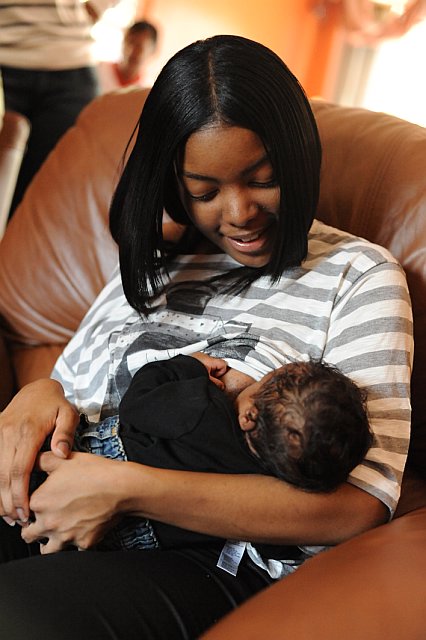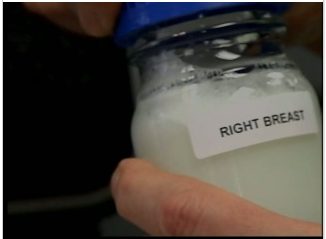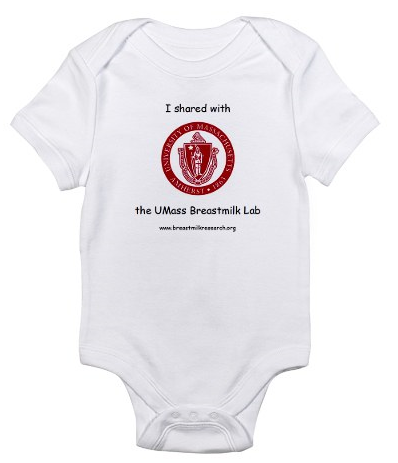Could African American Moms’ Breast Milk Hold the Keys to Preventing Breast Cancer?
 Note: If you’re an African American nursing mom living anywhere in the country and interested in donating breast milk for this research, please contact Beth Punska at (413) 545-0813, or email her at epunska@vasci.umass.edu. More information is also at the study website. If you’re not African American, you may still qualify for another study. Please see the study website.
Note: If you’re an African American nursing mom living anywhere in the country and interested in donating breast milk for this research, please contact Beth Punska at (413) 545-0813, or email her at epunska@vasci.umass.edu. More information is also at the study website. If you’re not African American, you may still qualify for another study. Please see the study website.
And women of all races, nursing or not, are encouraged to join the Love/Avon Army of Women, and select “breast milk study” when asked how you heard about it!
You’ve heard it many times before: breastfeeding and breast milk gives your baby important nutritional and immunological support.
But could breast milk hold the keys to preventing and treating breast cancer? And could African American moms’ breast milk be especially important?
It’s clear that African American women have a different pattern of breast cancer than other women. The U.S. Office on Women’s Health reports, "Research has shown that African-American women are more likely to get a form of breast cancer that spreads more quickly."
In spite of this difference, black women are also underrepresented in some important research which could get to the bottom of breast cancer risk, prevention, and treatment.
What is this research? It’s being done by Dr. Kathleen Arcaro at the University of Massachusetts, and it uses breast milk to assess breast cancer risk. We’ll explain.
Breast cells are key in breast cancer research, but they’re really hard to get. You can get a limited number through biopsy or extracting nipple aspirate (ouch!), but neither of these methods sound like much fun to most women. They also have limitations: breast biopsies only yield cells in a very small area of a breast, and nipple aspirate produces very few cells for analysis.
Enter breast milk. It’s been clear for some time that ductal breast cells naturally slough off into breast milk. The cells in breast milk of course come from all ductal areas of the breast, and they’re plentiful – an average of 30,000 per milliliter.
Until very recently the presence of these cells in milk was only an interesting footnote in the literature. But with the advent of DNA analysis, scientists can now extract DNA from these cells and look for patterns of “methylation” - methyl groups that attach to key parts of our DNA which are thought to regulate its functioning in important ways.
 For example, if a methyl group attaches to your tumor suppressor genes, it can essentially turn them off - kind of like you would a light switch. This leaves us more vulnerable to the growth of tumors. In a cancer-prone area of our bodies like the breast, their function is critical.
For example, if a methyl group attaches to your tumor suppressor genes, it can essentially turn them off - kind of like you would a light switch. This leaves us more vulnerable to the growth of tumors. In a cancer-prone area of our bodies like the breast, their function is critical.
Knowing this, Dr. Arcaro began looking for breast milk donations about ten years ago. Spreading the word through lactation consultants and others (and occasionally stopping a mother on the street), she found many mothers enthusiastic to donate their milk in the name of breast cancer research. Many viewed their milk donation as a way of fighting the disease which had taken the health and sometimes lives of friends and family members.
Dr. Arcaro’s research has already yielded some important results. She has found that certain patterns of methylation are correlated with a higher risk of breast cancer. These findings may pave the way for a personalized breast cancer risk profile for each woman. It also may lead to new treatments to reverse methylation and prevent breast cancer. Amazingly, some of the first generation chemotherapy drugs are in fact “anti-methylating” agents – drugs which can actually remove methyl groups from your DNA, allowing your DNA to function properly in the fight against cancer.
But Dr. Arcaro has a problem: the vast majority of her samples have come from white women. Her goal is to uncover findings that apply to all women. To ensure her findings applicable to women of all races – and because the differences in breast cancer between races needs to be investigated in its own right – she has been working to recruit African American women to donate breast milk samples.
 African American moms can play an important part by donating your own milk for this effort. It’s easy, quick, and makes a big difference! Dr. Arcaro’s lab sends moms a kit, a questionnaire and consent form, and moms send it back with their milk. They’ll send participants $25 in thanks for their time and effort.
African American moms can play an important part by donating your own milk for this effort. It’s easy, quick, and makes a big difference! Dr. Arcaro’s lab sends moms a kit, a questionnaire and consent form, and moms send it back with their milk. They’ll send participants $25 in thanks for their time and effort.
For African American who are not nursing, Dr. Arcaro still needs help! She’s urging participation in the Love/Avon Army of Women – a project aiming to recruit one million women to sign up to participate in breast cancer research (if they choose to do so). Having African American women well represented in the breast cancer research is key, for her research and many others.’ So Dr. Arcaro hopes women will sign up for the Army of Women (and be sure to select “breast milk study” in the drop down menu to help track the impact).
Dr. Arcaro’s lab is one of the few in the world which is consistently investigating the secrets breast milk holds for our understanding of breast cancer. You can learn more about Dr. Arcaro’s work, and see if you or mothers you know might qualify for one of her studies, at the website of the UMass Breast Milk Lab, and follow the lab on Facebook, Twitter, and Pinterest.


The views and opinions expressed in this post are those of the author(s) and do not necessarily reflect those of MomsRising.org.
MomsRising.org strongly encourages our readers to post comments in response to blog posts. We value diversity of opinions and perspectives. Our goals for this space are to be educational, thought-provoking, and respectful. So we actively moderate comments and we reserve the right to edit or remove comments that undermine these goals. Thanks!